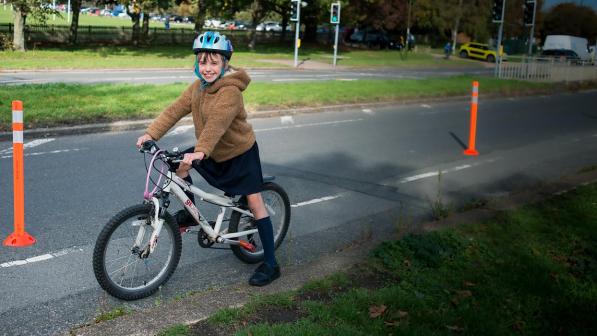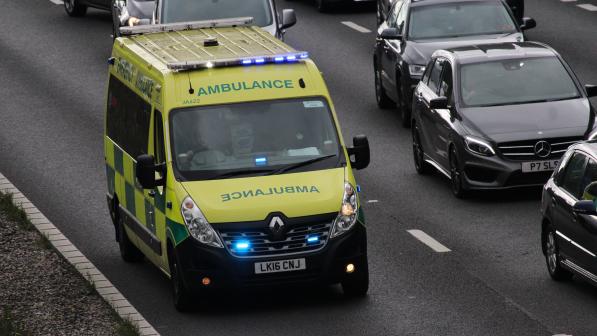Young people disproportionately affected by the removal of cycle lanes

The removal of cycle lanes across the UK in the wake of small but vocal pockets of protest will hit young people the hardest, Cycling UK has warned.
People under the age of 25, already likely to be the hardest hit by the economic effects of the pandemic (3), could now also be unfairly penalised if councils do not provide safe and secure cycle routes.
A survey carried out by YouGov on behalf of the national cycling charity, Cycling UK, revealed 71% of 18-24 year olds agree that the UK should make it easier for people to cycle by building more separated cycle lanes. Compared to 55% of people aged 55 and over.
That support only grows in the student population, with 77% of students in favour of providing more separated cycle lanes.
Cycling UK’s head of campaigns, Duncan Dollimore said:
“The UK needs to look to a future after the pandemic and support all those young people at the start of their careers or just about to begin them – part of that has to consider the transport choices available to them.
“Youth unemployment is projected to increase, and this will only be further exacerbated if cheap and efficient transport choices, like cycling is denied to them. The cost of buying and running a car, concerns about or a lack of public transport can all be significant barriers to work for young people, but could be overcome for many if we had safe networks of separated cycle lanes.”
The rising cost of driving has seen a steady decrease in young car owners since the 1990s (4) and many young people are also avoiding public transport because of concerns around coronavirus. Youth unemployment rose by 26% in the first six months of lockdown and is predicted in the coming months to rise by 52% from February 2020 figures (5).
Ruby Seber (23) graduated in 2020 and cycles to her job at a coffee shop in Glasgow. She said: “I love using my bike to get around the city; it’s the quickest, most affordable, and healthiest option for me, as well as a great way to get some fresh air.
“However, cycle lanes are very sporadic and so it often doesn’t feel very safe. Improved cycle lanes would make my journeys to work much smoother and safer, and I’d love to see more people being encouraged to start cycling as a result.
“No other form of transport is an option for me as I’m at the bottom of the list for vaccinations and I’m reluctant to use public transport. Fortunately, Glasgow city council decided to keep the road through Kelvingrove Park (a beautiful park in the West End of the city) closed to vehicles which has been great - I hope they make more similar decisions in the future!”
A recent report published by the Prince’s Trust found a quarter of young people are not confident about their future work, with close to half (48%) of those not in education, employment or training saying they “can’t see an end” to their unemployment (6).
“A post-pandemic recovery, and building back greener and better, means thinking about those for whom cycling is one of the only affordable modes of transport,” said Mr Dollimore. “It isn’t anti-car as some people claim, but it is unashamedly pro-bike and pro-people.”
Cycling UK’s research shows that 57% of 18-24-year-olds who are in favour of more separated cycle lanes, feel they will provide people with more transport choices.
With cycling currently making up only 1% of the mileage accumulated by all vehicular road traffic, Cycling UK says enabling more people to cycle by building more safe protected cycle routes is the only way to achieve the Government’s 2025 target of doubling levels of cycle activity, a target they are woefully behind at the moment (7).
In recent months, Cycling UK has seen multiple reports exaggerating opposition to new bike lanes, but the charity believes this, and other surveys repeatedly show that more than half of the UK support government schemes, including new cycle lanes, to encourage people to cycle and walk more (56%).
With the release of £175m in funding to councils in England for building new cycle and walking facilities announced by Transport Secretary Grant Shapps, Cycling UK is urging councils to invest in more separated cycle lanes, rather than ripping them out after a few weeks in knee-jerk responses to a vocal minority.
“If we make it difficult for everyone to cycle by removing safe, separated cycle lanes, we can’t be surprised when people don’t change their travel behaviour, congestion and pollution increase, and public health worsens,” said Mr Dollimore. “Worse still, we’ll be limiting the transport choices of young people or locking them into car dependency, when they’re already the generation whose futures will be most affected by coronavirus.”
Notes to editors
- Cycling UK, the national cycling charity, inspires and helps people to cycle and keep cycling, whatever kind of cycling they do or would like to do. Over a century’s experience tells us that cycling is more than useful transport; it makes you feel good, gives you a sense of freedom and creates a better environment for everyone. www.cyclinguk.org
- All figures, unless otherwise stated, are from YouGov Plc. Total sample size was 2094 adults. Fieldwork was undertaken between 12th - 13th November 2020. The survey was carried out online. The figures have been weighted and are representative of all UK adults (aged 18+).
- Lawrie, E. and Butcher, B. (2020) Employment: Seven ways the young have been hit by Covid. BBC News Online: https://www.bbc.co.uk/news/explainers-54005156
- Chatterjee, K., et al. (2018). Young People’s Travel – What’s Changed and Why? Review and Analysis. Report to Department for Transport. UWE Bristol, UK. www.gov.uk/government/publications/young-peoples-travel-whats-changed-andwhy
- https://tradingeconomics.com/united-kingdom/youth-unemployment-rate
- Prince’s Trust, Tesco Youth Index (2021): https://www.princes-trust.org.uk/about-the-trust/news-views/tesco-youth-index-2021
- www.parliament.uk, Active travel: increasing levels of walking and cycling in England: The Government’s Cycling and Walking Investment Strategy. Point 18.
- For a collation of research proving the benefits of active travel see: https://www.cyclinguk.org/article/six-reasons-build-cycle-lanes.
Press contact information
For more information, please contact the national Cycling UK press office. Due to the restrictions caused by the coronavirus outbreak, currently the main press office number (01483 238 315) is not being monitored.
If you would like to speak to a member of the press office please call 07786 320 713.

